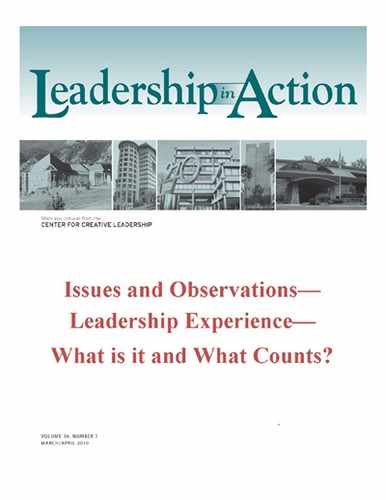Issues & Observations
Leadership Experience: What Is It and What Counts?
Douglas T. Hall, Kelly M. Hannum, and John F. McCarthy
The leadership experience of the candidates was one of the key issues during the campaigns leading up to the November 2008 presidential election in the United States. The media and public discourse not only highlighted the importance of experience but also made it clear that experience can mean different things to different people.
There are a lot of assumptions behind the word experience. Saying merely that a candidate is experienced does not provide a lot of actual information about what that candidate can do or why his or her abilities are relevant to the position sought.
The good news is that a great deal of leadership development research has been conducted on experience. This research tends to indicate that past experience in a job is not necessarily the best predictor of future performance. This may seem counterintuitive, but think about the unpredictable and rapid changes occurring globally and consider the effects of these changes on jobs. Such changes suggest that the future demands of a job are likely to be different from current demands as former job skills become less relevant or no longer provide an edge and new skills have to be learned and applied. An individual who had information technology network security experience five years ago, for instance, is unlikely to be able to perform that function effectively today without retraining.
Experience clearly matters, but there are multiple components of experience to be taken into account and considered:
- The nature of the work itself (the know-how and problem-solving ability required and the personal accountability involved)
- The sector in which the person has worked (public, private, or nonprofit)
- The sphere of life in which the experience occurred (such as a business corporation, a volunteer organization, a community work effort, or even family life)
- The variety of industries in which the person has had experience
- The learning that resulted from the experiences
Research conducted by Ayse Karaevli while she was completing her doctorate in business administration at Boston University's School of Management found that diversity of experience is at least as important as depth of experience in predicting an executive's future success. (Karaevli is now an assistant professor of strategy in the Faculty of Management at Sabanci University in Istanbul, Turkey.) This research indicates that an individual who has been exposed to and has worked in multiple functions, varying roles, or multiple companies may be a better candidate in today's business environment than someone who has done one thing well for a single company for a long time. There is a not-so-humorous joke about a job candidate who claims twenty years of experience only to have the hiring manager respond, “Yes, but you experienced the same year twenty times.” The implication is that enhanced learning requires a diversity of experiences.
